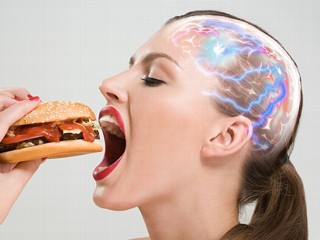Nelson sat across from me talking about bread. That was what he missed most—more than candy, more than oily buttered popcorn. But he had to avoid bread, he said, because that was what was keeping him from losing weight. He currently weighed 290 pounds and was less than six feet tall. That put him squarely in the obese category, but it was significantly better than the close-to-400 pounds he had weighed not long ago. Nelson’s surgery to reduce the size of his stomach had produced dramatic results, but he had started gaining the weight back, and was worried he had flushed thousands of dollars in medical expenses down the drain.
Nelson was in my office to talk about his food addiction. As a therapist, I work with addiction all the time. I regularly treat people who are addicted to drugs and alcohol. But I also help people who are addicted to pleasurable everyday things like shopping, sex, work, the internet, gaming, and food.
Food addiction is driven by the same neurotransmitters as drug addiction. The dopamine reward is our brain’s way of saying “That feels good. Do more of that.” Our ancestors needed that message to get them to consume foods like fat, sugar, and carbs, and we developed preferences for the tastes and mouthfeel they produce. Those foods were necessary to fuel a days-long hunting journey. But necessary for eight hours at a desk? Followed by four hours in front of the TV? Not so much.
For people like Nelson, the dopamine reward system has been hijacked by their emotional life. While pizza tastes good to almost everyone, Nelson used it to manage difficult emotions. So when his brain responded naturally to the salt and carbs—the bread he so craved—by rewarding eating with dopamine, it wasn’t just satisfying physical hunger; it was soothing painful feelings. In addiction, over time eating becomes less about the body and more about the soul. The feeling of physical satiety gets overridden because, while the stomach is only so big, the addict’s depression or trauma or emotional upset feels bottomless. Food becomes the solution to fill that chasm. But now, food has as much to do with real nourishment as pornography has to do with real sex. When we try to meet our emotional needs with food, it doesn’t work, and it doesn’t do our physical needs any favors either.
I’m not a food addict. But with over two weeks now of eating only rice and beans, I am acutely aware of how I use food emotionally. Eating is something I look forward to (or used to). A reward for a long day. And for the most part I get to pick and choose just about whatever I want. With those options temporarily removed, my sense of entitlement increases. Coffee is for reading, drinks are for hanging with friends, and chips are for downtime, right? When those activities are less enjoyable today because of my diet, the problem is not in the activities. It’s in my use of food.
Of course, eating for more than fuel isn’t a bad thing. We eat for friendship, pleasure, ceremony. But when I eat certain foods to create or change certain emotions, I see I’m not so different from Nelson. Today I want to live fully in my experiences, irrespective of the foods I eat while doing them.

